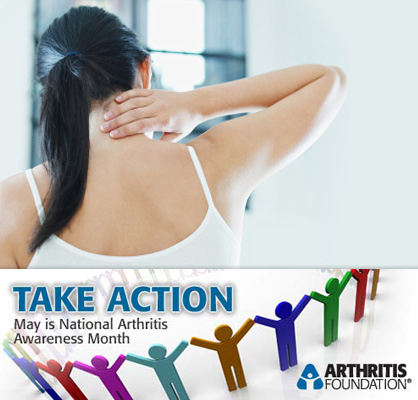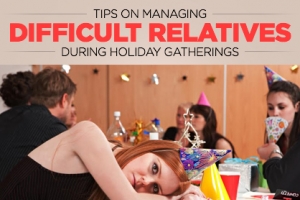Arthritis: The leading cause of disability in the US
One day, you may feel okay. The next day you can’t even lift your arms to brush your teeth or even get a drink of water from the sink. Arthritis affects 50 million (1 in every 5) adults and nearly 300,000 children in the United States, making it the country’s leading cause of disability. While it’s not a death sentence, it can lead to serious health ailments such as joint deformities, a weak susceptible immune system and depression—not to mention the daily debilitating chronic pain. This disease can be life-threatening, and May is National Arthritis Awareness Month.
Jennifer Ziegler, who was lucky enough to be diagnosed early while still a baby, has found that “arthritis affects everything you do.”
“(You can feel) that your body is giving up on you, and you don’t have control of it anymore,” she said.
It is practically unheard of for arthritis to be detected that young, but Jennifer’s mother knew something was wrong. She took her daughter to see a doctor, who first accused her of child abuse, assuming Ziegler had broken bones. X-rays soon confirmed she didn’t. One referral later and a children’s hospital realized she had arthritis. “I was put in physical therapy as soon as I could walk, to work on the way I walked.” She has been in treatment and on medication her whole life.
All of her experiences have made her passionate about the cause. From her involvement as a child seeking help, she has turned into becoming a volunteer, then a staff member with the Arthritis Foundation, a national, volunteer-driven health organization dedicated to bettering the lives of people with arthritis.
“We are the number one nonprofit for arthritis,” Ziegler, program director of the Pacific region, explained. “Arthritis can affect anyone and everyone, and we help everyone and anyone who is dealing with this disease.”
Founded in 1948, the staff is committed to the vision of “a world free of arthritis pain.”
Through funding research to find a cure, providing public health education and programs, and advocating for public policy and legislation, the Arthritis Foundation works to improve the lives of people affected by arthritis. So far the foundation has raised more than $400 million toward a cure.
“We are a volunteer-driven, strategically-focused organization with a passion to fight arthritis pain,” Teri Lim, chief marketing officer for the Pacific region, said. “… The pain (and limitations) caused by arthritis is unacceptable.”
All this work translates to many lives touched. At age 4, Brian* was diagnosed with juvenile arthritis. He was the only person at his school to suffer from the disorder and was thus the subject of much teasing. This only made his experience worse. Then last year he attended the Arthritis Foundation’s youth camp, Camp Esperanza. He not only had fun with camp activities, but also met peers who understood what he was struggling with, developing new friendships that changed his life.
Lim reports there are a number of misconceptions about arthritis. Arthritis is not just reserved for the elderly. Around two-thirds of sufferers are younger than 65, and it can affect children. It is not just aches and pains, but can attack your immune system with results that are, said Lim, “life-threatening.”
The word arthritis literally means joint inflammation (“arth” = joint; “itis” = inflammation). Under normal conditions, the body’s immune system makes proteins called antibodies to fight infections such as bacteria or viruses. In people with some types of arthritis, the immune system still has this function, but it also attacks the body’s own healthy tissues. Because arthritis sometimes involves an immune system that turns against the body, it is considered an autoimmune condition. Inflammation can lead to the destruction of cartilage, bone, and other tissues in and around the joint, thus causing deformities that severely limit the body physically. There are treatments that can dampen the immune system attack and relieve the symptoms.
Some days, Ziegler reports, however, meds don’t work. “The medication is not perfect,” she said. “Arthritis can find ways around it. You can still have flare-ups, even if the medication is working.” Ziegler personally takes a drug used with cancer patients and has suffered from nausea and hair loss, plus has been forced to get both hips replaced.
“It’s not just an old person’s disease. It is not just wear and tear,” Ziegler said. “It can be very devastating.”
Ziegler reports the cause doesn’t get the attention it deserves.
“Sometimes people say … ‘It’s not serious like other diseases.’ And they just don’t realize that it may not be a death sentence, but it is a life sentence. It is something you are going to live with until the day you die. And it will be painful for every day you live with it,” she said.
Her message: You can control the disease; the disease doesn’t have to control you.
The foundation’s programming runs the gamut, including providing thousands of land and aquatics exercise opportunities, Tai Chi courses, educational programs, a life improvement series and a self-help, chronic disease management program which “makes you learn to accept your disease and helps you move forward.” Their arthritis walks have been inspiring for the participants, many of whom, despite their arthritis, tackled a 3-mile walk. Funding research is a vital component, to make advancements in medications and treatments, and eventually find a cure.
For more information on arthritis, the programs and services of the Arthritis Foundation, and a way to help out the cause, please visit www.arthritis.org.
Has arthritis affected you or someone you love? If so, how and what have you done to deal with it?
Tagged in: lux exclusives, charity, nonprofit, philanthropy, organization, arthritis foundation, arthritis,

Purple Neon/LadyLUX via Arthritis Foundation



